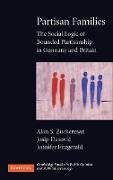Partisan Families
BücherAngebote / Angebote:
People decide about political parties by taking into account the preferences, values, expectations, and perceptions of their family, friends, colleagues, and neighbours. As most people live with others, members of their households influence each other's political decisions. How and what they think about politics and what they do are the outcomes of social processes. Applying varied statistical models to data from extensive German and British household surveys, this book shows that wives and husbands influence each other, young adults influence their parents, especially their mothers. Wives and mothers sit at the centre of households: their partisanship influences the partisanship of everyone else, and the others affect them. Politics in households interacts with competition among the political parties to sustain bounded partisanship. People ignore one of the major parties and vary their preference of its major rival over time. Election campaigns reinforce these choices.
Folgt in ca. 15 Arbeitstagen




